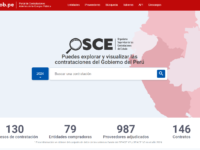Wildfires is one of the main causes of blackouts in Brazil. To monitor the thousands of Brazilian Transmission Lines (TLs), ANEEL created the GGT System, which consists of a tool that uses Artificial Intelligence and satellite images processing to preventively inspect the maintenance of TLs against wildfires. With the GGT System, there was a 89% reduction in shutdowns caused by wildfires, representing a great improvement in the reliability of the electricity offered to the Brazilian population.
Innovation Tag: Methods and Tools
The project proposes a system for extracting and analysing information from the medical records of breast cancer patients, using artificial intelligence. This would support research, personalised medicine and health decision-making, benefiting clinicians and regional authorities. This provides an automated alternative to accelerate translational research, promote personalised medicine and improve the efficiency of health services.
Case Study
Portal de Contrataciones Abiertas de la Compra Pública -Open Procurement Contracting Portal

The Organismo Supervisor de las Contrataciones del Estado (OSCE) supervises public procurement, ensuring integrity and efficiency. Its Portal de Contrataciones Abiertas de la Compra Pública plays a crucial role, improving transparency with international standards. By implementing the Open Contracting Data Standard (OCDS), it provides detailed access, benefiting entities, suppliers, citizens and civil society.
Case Study
Everyday Safety and Convenience through Cutting-Edge Technology: Seongdong’s Smart Shelter &…

Smart shelter
Seongdong District’s smart shelter applies smart technologies to the bus stop to provide not only real-time traffic information but also 18 useful services, including public Wi-Fi and phone charging.
Smart crosswalk
Seongdong District’s smart crosswalk uses cutting-edge technologies (in-ground traffic light, pedestrian traffic light, voice guidance, etc.) to prevent accidents caused by pedestrians using smart phones while walking and protect children and seniors.
13 Fellows from 10 different African countries in 8 institutions of the African Union to build a culture of digital innovation: the AU Digital and Innovation Fellowship is the first supranational initiative to make administrative processes in the African Union more user-centred and effective. The challenge: 12 months to integrate innovation into the African Unions processes and products. The results: 11 products in diverse AU institutions and units. And that is just the start!
The Government of Canada is experimenting writing existing laws and proposed regulations into code. Encoding rules allows us to run legal simulations in the regulatory drafting room, which helps us detect ambiguities, loopholes, and gaps in the rules that often go unnoticed. However, existing tools designed by and for programmers are not intuitive for rule-makers. In response, we set out to develop one – an open-source Rules as Code tool called Blawx.
The National Internship Program, coordinated by the Presidency of the Republic of Türkiye Human Resources Office, is a nationwide program designed to assist youth employability and school-to-work transition. It involves all public institutions and voluntary employers with the aim of providing internship opportunities for university students with principles of equal opportunity and merit ensured by its platform. The Program helped and encouraged candidates to engage in activities for their…
The Aao School Chalein (School Enrollment Drive) initiative in Haryana addresses student enrollment challenges through a mrico-improvement (MI) approach and collaborative action. By empowering school leaders, leveraging technology, and using creative strategies to engage various stakeholders, it encourages community participation to boost student enrollment. This approach has the potential for collaborative, scalable solutions in addressing many education challenges, at scale.
MATEC is the educational project for teacher training and support that promotes an innovative teaching methodology to enhance the learning of mathematics through technology. It was created in response to the declining performance in mathematics, the low inclusion of technology in classroom practices and the need for new tools to personalise student learning and meet the challenge of diversity in the classroom.
Karolinska University Hospital is piloting a new model for nurse-led innovation. The model consists of a framework for enabling nursing organisations to work with innovation and a nurse-led innovation hub concept, where nurses can collaborate with the industry to co-develop solutions for healthcare. Through this, the hospital puts nurses in the driving seat of innovation in healthcare to both develop better solutions for healthcare and promote a sustainable work life for frontline staff.


